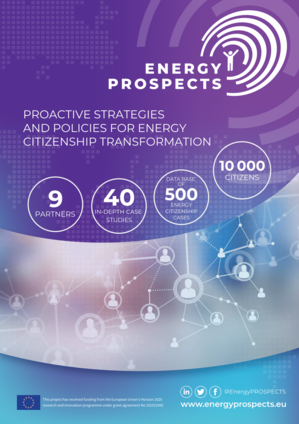Project summary
EnergyPROSPECTS (PROactive Strategies and Policies for Energy Citizenship Transformation) worked with a critical understanding of energy citizenship that was grounded in state-of-the-art Social Sciences and Humanities (SSH) insights. Funded under the EU Horizon 2020 programme for three years, EnergyPROSPECTS aimed to develop a broad understanding of energy citizenship as a policy concept, a sociotechnical imaginary, a knowing-of-governance, i.e. a social construction of desirable/normal civic agency in future energy systems.
The project has identified and examined a range of cross-cutting issues in energy citizenship, which contributed to the iterative typology development and criteria for case selection. Drawing on existing databases and a search for new cases, a selection of almost 600 initiatives and mapping and typology refinement exercises were performed to demonstrate the depth/breadth of the energy citizenship concept in theory and practice.
Forty cases were selected for in-depth analysis exploring development, evaluation, intermediaries, institutions, governance, and ICT in energy systems. Using a multi-actor perspective, an empowerment toolkit for practitioners and citizens has been developed, co-creating viable strategies, developing new business and social innovation models, and new forms of organisation to advance energy citizenship.
EnergyPROSPECTS’s primary objectives were to:
- Develop an innovative conceptual framework for the understanding of energy citizenship.
- Identify diversity of types and empirical manifestations of energy citizenship.
- Identify constraining and enabling conditions to active energy citizenship.
- Identify and assess the more and less favourable outcomes and impacts of different forms of energy citizenship.
- Enhance engagement with citizens, practitioners and policy-makers, analyse and design more effective ways of engaging citizens and other stakeholders.
- Translate findings and insights into tools and interventions for citizens and practitioners, new business and service models.
A critical part of the research involved analysing the external and internal contextual conditions as they support or hinder energy citizenship in its various forms. Based on the analysis the project matched suitable models and forms of organisation with different countries, regions, and contexts, and conducted a citizen survey to appraise the validity of various scenarios as well as discussing and refining results in citizen workshops and policy forums. This produced practical policy outputs which were revised with policy actors in knowledge exchange workshops.
The EnergyPROSPECTS consortium included nine research partners (universities, research institutes, enterprises and NGOs) from Ireland, Belgium, Hungary, Netherlands, Bulgaria, France, Latvia, Germany and Spain.
